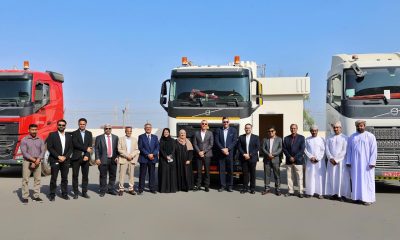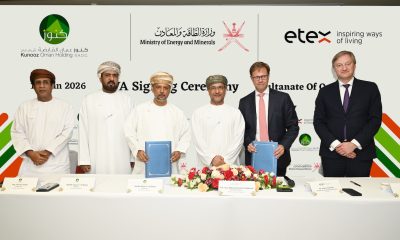Banking & Finance
In expansion mode
An Islamic bank cannot establish itself only by virtue of offering sharia- compliant services, but has to prove its mettle in a highly competitive market by capitalising on emerging business opportunities with quality services and products, says Sulaiman Al Harthy, Head of Meethaq Islamic Banking, Bank Muscat.

An Islamic bank cannot establish itself only by virtue of offering sharia- compliant services, but has to prove its mettle in a highly competitive market by capitalising on emerging business opportunities with quality services and products, says Sulaiman Al Harthy, Head of Meethaq Islamic Banking, Bank Muscat. Excerpts from a freewheeling chat with Muhammed Nafie.
Meethaq Islamic Banking has completed one year of operation. How was your performance in 2013 and what does distinguish you from other operators?
Meethaq’s performance in the first year of operation was far beyond our expectations. Customers were very excited about all our products, especially our flagship product, home financing. There has been a huge turnout in all our branches.Our financial results for the year 2013 will be out very soon. We have posted a net profit of RO5.7mn.
One of our main strength areas is our expertise in Islamic finance which enables us to give proper guidelines and instruction about what distinguishes our Islamic banking products . Several customers come to us after going to many places and without having a proper understanding of the products they are seeking. We are equipped with a highly trained staff capable of educating customers properly on all the nuances of our products. Another advantage of Meethaq is the speed with which we process the proposals and respond to the queries of customers.
How is the demand for the Islamic products and services you are offering currently?
The demand for our home financing has been phenomenal, in line with a surge in the number of people who build new houses or are looking to invest in property development. Our other personal finance products include auto finance, debit cards and credit cards, current account and fixed deposit accounts. When it comes to corporate financing, we have launched a diminishing Musharaka product generating a lot of interest in the market. In addition, we have a number of new products in pipeline, which are expected to be launched in 2014.
You have already opened quite a number of branches. Can you elaborate on your branch and ATM network expansion strategy?
Right now we have five branches that are operational and we are expecting to open several more branches in 2014. Primarily, we want to establish ourselves in all major cites of the Sultanate. We are targetting more populous places in the country where we can serve more customers rather than opening branches randomly. At this stage, we are very selective about branch expansion, as setting up a branch involves a lot of expenses.
How is Islamic banking industry shaping up in Oman and what are the major challenges?
From day one, we have not looked at Islamic banking from a narrow perspective of serving the Muslim customers only. We have positioned ourselves as a bank offering sharia-compliant banking products and services to both Muslim and non-Muslim customers alike. We are looking to explore all business opportunities that a conventional bank might do, except for that our operation will be 100 per cent sharia-compliant. Therefore the way Islamic banking shapes up in Oman is similar to how the entire baking industry is shaping up in the country.
For example, there is a petrochemical project worth RO500mn and as any bank we are looking to bid for financing the project. Likewise, the opening of a new shopping mall is as much a business opportunity for us as it is for other conventional players. So a growing economy holds a lot in store for us as any other bank. But there are some challenges faced by Islamic banks, such as higher governance cost which makes the operation of Islamic bank more expensive than that of a conventional operator. For example, when the latter requires only one external auditor to verify its financial results, we need to go through a few more additional steps such as the approval of Sharia board and an external Sharia auditor before sending it to an external auditor. But we cannot generate business only because we are a Sharia-complied bank, because the real challenge lies in ensuring the quality and value of the products, in order to sustain in a highly competitive market.
Islamic finance in Oman was initially portrayed to be a business opportunity running into billions of dollars, with a wave of repatriated funds from abroad. Was it an overblown assessment?
It was all based on some conjectures by some bankers, financial experts and institutions. But they were not at all based on any facts. The reality is that Islamic banking cannot establish itself only because it is Islamic, but has to prove its mettle in a highly competitive market by exhibiting its stamina and verve to capitalise on emerging business opportunities with quality services and products. It’s too premature to announce that Islamic finance will constitute such and such percentage of the banking industry within in a given time.
Do you think that at this initial stage the market is too small to accommodate eight operators (including six windows and two full-fledged banks) who all started operation in one year’s time?
As I I already mentioned, the competition cannot be restricted to Islamic banking only. We need to look at it from a wider angle. The overall banking sector is getting more competitive. The arrival of more new operators informs the diversity and vibrancy of Oman’s financial sector. There is no question of saturation as long as country’s economy is getting stronger offering a lot of new business opportunities for bankers.
Bank Muscat is the largest bank in the Sultanate. How Meethaq could leverage on the advantage of being the Islamic window of Bank Muscat?
Being part of Bank Muscat offers a lot of advantages for us. We don’t need to have separate departments for HR, IT and Corporate Communications etc, until and unless it is mentioned in Sharia regulations of CBO. And moreover, we definitely have the Bank Muscat way of thinking big.
What do you do to increase public awareness about Islamic finance in the country?
We have done extensive awareness campaigns across the country. Initially we focused mainly on generating awareness about the basics of Islamic banking so that people will understand what Islamic finance is all about, and then we move on to marketing our products and services. We conduct wider campaigns targetting the public in general as well as specific activities focusing on smaller groups, such as government employees and staff members of a particular company or institute. When we conduct awareness programme for the staff of a company or the Ministry, it becomes a process of mutual benefit for all of us involved.
Recently we signed a Memorandum of Understanding (MoU) with the Ministry of Endowments and Religious Affairs to do a campaign on Zakat by visiting people in mosques and other places. We will educate them on how to calculate and pay Zakat, and we have developed a mobile app to calculate Zakat. We signed the MoU after having done a lot of homework, but unfortunately we came to know that after we clinched the deal some other players who have not studied it properly rushed to the Ministry with all sorts of offers.
We had done a lot of awareness in the interiors also including a very successful campaign called Zakati. During the last Ramadan, Meethaq did a unique awareness campaign based in the Grand Mosque by alerting people about the importance of maintaining good manners and leading a religious life, seeking to build a long term association with people. Currently, we are moving to educate people about the importance of personal finance management to inculcate saving mentality in them. Then we will make them aware of our Islamic finance product such as auto finance and home finance. People who can understand the importance of Islamic finance are quick to embrace our products in a big way in the villages. However it will take time before they fully realise its true potential.
What is your outlook for 2014?
The year 2014 is going to be an exciting year. Government has signed a huge gas contract worth $16bn with BP. PDO has announced various In Country Value (ICV) projects worth $68bn and the government is in the process of massive infrastructure development such as roads, ports, airports and other tourism development projects. Therefore economic outlook is brighter for the banking sector in 2014.
-

 News2 months ago
News2 months agoAI Security Conference 2025 Hosted by Securado Highlights the Changing Cybersecurity Landscape
-

 Insurance2 months ago
Insurance2 months agoSupporting Community Wellness: Liva Insurance Sponsors Muscat Marathon 2026 with Free Health Checkups
-

 Interviews1 month ago
Interviews1 month agoEXCLUSIVE INTERVIEW: TLS Rebranding Marks Strategic Leap Toward Innovation, Sustainability & Growth
-

 Insurance1 month ago
Insurance1 month agoLiva Insurance Supports Community Wellness Through “Experience Oman – Muscat Marathon 2026”
-

 Investment3 weeks ago
Investment3 weeks agoLalan Inaugurates Its First Overseas Manufacturing Facility, Marking Sri Lanka’s First Investment in SOHAR Freezone
-

 Banking & Finance1 month ago
Banking & Finance1 month agoA New Platform for SME Growth: Oman Arab Bank Unveils Tumouhi
-

 Construction4 weeks ago
Construction4 weeks agoInternational Heavy Equipment hosts Open Day at its Refurbished Facility in Sohar Industrial Area
-

 News3 weeks ago
News3 weeks agoKunooz Oman Holding Partners with Belgian company Etex for Local Gypsum-Based Business Development






























You must be logged in to post a comment Login